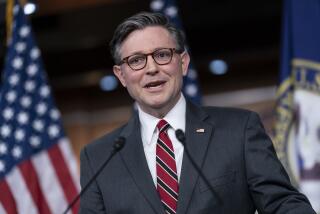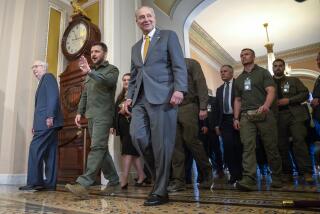U.S. âEncouragedâ by Positive Signs in Lithuania : Diplomacy: Washington appears to endorse a referendum on secession. Baker and Shevardnadze seek a firm summit date.
WASHINGTON â Cautiously encouraged by signs of a break in the Lithuanian impasse, the Bush Administration appeared Wednesday to endorse the Soviet call for a referendum among Lithuanians to decide whether the Baltic state should become independent of the Soviet Union.
Secretary of State James A. Baker III also seemed upbeat about the prospects for setting specific dates for the next U.S.-Soviet summit, despite the Lithuanian crisis.
He told journalists that he hopes the Lithuania situation will not interfere with the planned meeting sometime in June of President Bush and Soviet President Mikhail S. Gorbachev. âI would not leave you with the impression that it would,â he said.
Soviet Foreign Minister Eduard A. Shevardnadze, arriving in Washington for three days of talks, responded noncommittally when asked about the summit. âWeâll see,â he said.
Setting a summit date is viewed as an important indicator of how closely the superpowers will allow their relationship, including completion of two far-reaching arms reduction agreements, to be affected by events in Lithuania.
The failure to decide on a summit schedule during the Shevardnadze visit would signal a downturn in U.S.-Soviet relations, several U.S. officials said.
If dates are set, the two nations apparently will have concluded that unless the situation worsens greatly--a Soviet military crackdown, for example, followed by U.S. sanctions of some kind--their larger interests must rise above Lithuania.
On Capitol Hill, Congress continued to pressure the Administration to take a stiffer stand against Soviet attempts to intimidate the Lithuanians. The House approved a resolution urging the White House to plan for recognition of the Lithuanian government. The Senate previously called on the Administration to consider the same move.
In welcoming Shevardnadze, Baker said, âwe are encouraged that we see references coming from both sides to the concept or possibility of some sort of referendum approachâ to resolving the Lithuanian crisis.
âA referendum,â Baker said, âis one way for parties to express self-determination.â
A senior State Department official said last week that Baker had suggested the idea of a referendum on Lithuania to Shevardnadze last September when the two men met in Wyoming. âWhy donât you have them vote on it?â Baker reportedly told the Soviet official.
The senior official said it was ânot the position of the United States to prescribe a solutionâ to the Lithuanian crisis. He also noted that the United States did not necessarily endorse the details of a tough new Soviet law requiring a two-thirds vote for secession followed by a five-year transition period to independence.
Early in the day, Baker welcomed the apparent opening of talks Tuesday between Lithuanian and Soviet officials. âWe are encouraged by the fact that it would appear at least that there are the beginnings of a dialogue,â he said.
But later, after learning that a second meeting between a Lithuanian delegation and the Soviet interior minister in Moscow had been canceled, Baker said: âWe will be exploring (with Shevardnadze) the degree to which there is in fact the beginning of some dialogue.â
Shevardnadze said he was not aware of the meeting cancellation. But he implied that the crisis would have a peaceful outcome.
âLet me tell you very authoritatively that we will be able to find a solution to that situation,â he said. âThat solution will be consistent with the interests of the entire Soviet Union and with the interests of Europe.â
The two men met for 3 1/2 hours, spending most of their time on Lithuania and arms control issues. The June summit has been described as an arms control summit, at which the final major hurdles to a START nuclear arms reduction treaty will be resolved.
Shevardnadze brought with him a letter to Bush from Gorbachev in response to a letter that the President sent to the Soviet leader last week. In his letter, Bush urged peaceful resolution of the Lithuanian independence bid and assured Gorbachev that he was not attempting to cause difficulties for either side.
The contents of Gorbachevâs reply were not divulged.
Meanwhile, the House adopted by a vote of 416 to 3 a carefully worded resolution urging the Administration âto plan for and take those steps, at the earliest possible time, that would normalize diplomatic relations with the new government of Lithuania.â
The United States never recognized the forcible Soviet incorporation of the Baltic state 50 years ago, but it also has not extended official recognition in response to the March 11 declaration of independence by Lithuaniaâs newly elected legislature.
A similar resolution, adopted unanimously by the Senate two weeks ago, called on Bush to âconsiderâ recognizing the new Lithuanian governmentâs call for recognition.
The measures, neither of which have force in law, implied mild criticism of the Presidentâs muted response to the Soviet crackdown. But in both chambers, Democratic leaders headed off attempts by conservative Republicans to pressure Bush to act even more forcefully.
Rep. Lee Hamilton (D-Ind.) said the House resolution tried to avoid encouraging unilateral action by Lithuania that might provoke a Soviet crackdown.
BACKGROUND
LITHUANIA--a tiny fragment of the Soviet Union, was once a much larger and more important player in world affairs.
In the Middle Ages, it was one of the largest and most powerful European states, extending from the Baltic to the Black Sea and embracing much of what is now Poland, Byelorussia and the Ukraine. In 1385, Lithuania and Poland formed a federation that lasted for four centuries, ending in a series of partitions completed in 1795 between Germany and Czarist Russia.
A much-smaller independent Lithuania was reconstituted in 1918, at the end of World War I, only to be incorporated into the Soviet Union at the outset of World War II.
The Land: 25,200 square miles, about the size of West Virginia.
The People: Estimated at 3.6 million, more than 80% ethnic Lithuanians plus Russians and Poles.
The Economy: Traditionally agricultural, but industry has increased sharply in the past few decades.
ESTONIA--It was absorbed along with Lithuania and Latvia by the Soviet Union at the outbreak of World War II. It had declared its independence in 1918 after centuries of rule by various nations, including Denmark, Sweden and Russia.
The Land: 17,413 square miles; mainly lowland with numerous lakes.
The People: about 1.6 million, 68% ethnic Estonians with 25% Russians and less than 5% Ukrainians, Byelorussians and Finns.
The Economy: Leading supplier of wood products to Soviet Union, also shipbuilding and repair.
Times staff writers Norman Kempster, Paul Houston and Don Shannon contributed to this story.
More to Read
Sign up for Essential California
The most important California stories and recommendations in your inbox every morning.
You may occasionally receive promotional content from the Los Angeles Times.










